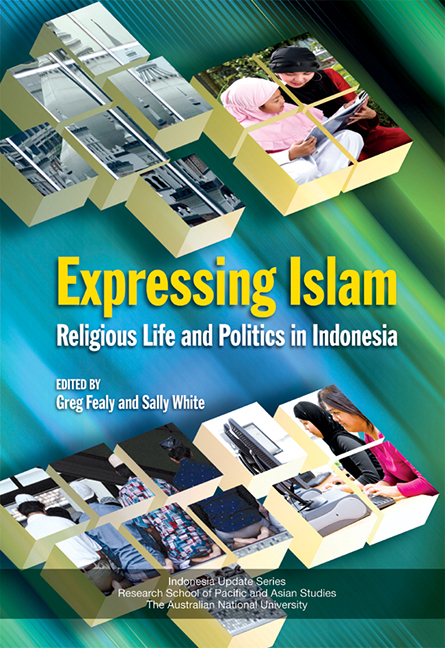Book contents
- Frontmatter
- Contents
- List of Figures and Tables
- List of Contributors
- Acknowledgments
- Glossary
- Map
- 1 Introduction
- PART I EXPRESSING PERSONAL PIETY
- 2 Consuming Islam: Commodified Religion and Aspirational Pietism in Contemporary Indonesia
- 3 Modulations of Active Piety: Professors and Televangelists as Promoters of Indonesian ‘Sufisme’
- 4 Throwing Money at the Holy Door: Commercial Aspects of Popular Pilgrimage in Java
- 5 ‘Spiritual Meal’ or Ongoing Project? The Dilemma of Dakwah Oratory
- 6 Marketing Morality: The Rise, Fall and Rebranding of Aa Gym
- PART II POLITICAL, SOCIAL AND LEGAL EXPRESSIONS OF ISLAM
- PART III THE ISLAMIC ECONOMY
- Index
- Indonesia Update Series
- Plate section
6 - Marketing Morality: The Rise, Fall and Rebranding of Aa Gym
from PART I - EXPRESSING PERSONAL PIETY
Published online by Cambridge University Press: 21 October 2015
- Frontmatter
- Contents
- List of Figures and Tables
- List of Contributors
- Acknowledgments
- Glossary
- Map
- 1 Introduction
- PART I EXPRESSING PERSONAL PIETY
- 2 Consuming Islam: Commodified Religion and Aspirational Pietism in Contemporary Indonesia
- 3 Modulations of Active Piety: Professors and Televangelists as Promoters of Indonesian ‘Sufisme’
- 4 Throwing Money at the Holy Door: Commercial Aspects of Popular Pilgrimage in Java
- 5 ‘Spiritual Meal’ or Ongoing Project? The Dilemma of Dakwah Oratory
- 6 Marketing Morality: The Rise, Fall and Rebranding of Aa Gym
- PART II POLITICAL, SOCIAL AND LEGAL EXPRESSIONS OF ISLAM
- PART III THE ISLAMIC ECONOMY
- Index
- Indonesia Update Series
- Plate section
Summary
On the eve of the 50th anniversary celebration of the Asian–African Conference in 2005, Kiai Haji Abdullah Gymnastiar, the charismatic television preacher known across Indonesia as Aa Gym, admonished Muslim leaders to become more savvy about marketing the ‘beauty of Islam’. Likening Muslim leaders to marketers and Islam to fruit, Aa Gym asserted: ‘If a person does not know how to market it right, even a delicious durian won't sell’.
Aa Gym himself had captured the hearts of Indonesians by marketing his message of Managing the Heart (Manajemen Qolbu or MQ) through books, nationally televised sermons and Islamic training seminars. More than a preacher, Aa Gym had become a self-help guru and MQ his formula for Islamic virtue. By 2002, millions of Indonesians were watching his television shows; hundreds of thousands were making pilgrimages to his Islamic boarding school (pesantren); and politicians were lining up for photo-ops during campaign season. His multi-level marketing firm MQ Baroqah (MQ Blessings) sold Qolbu cola, Qolbu noodles and MQ shampoo. Aa Gym had succeeded in turning himself into an icon of Islamic virtue, his turban into a trademark, and MQ into a nationally recognised brand name.
Then, at the pinnacle of his public adoration, Aa Gym took the path of polygamy. Everything changed. Feeling heartbroken and betrayed, his female followers abandoned him and his polygamous marriage became the subject of national scandal. Infotainment shows and gossip magazines circulated stories of former admirers shredding his pictures, boycotting his television shows and cancelling weekend pilgrimages to his pesantren and ‘spiritual tourism’ complex, Daarut Tauhiid. Under pressure from the public protests, President Susilo Bambang Yudhoyono (SBY) ordered a review of the national marriage law. Overnight, Aa Gym became a political and corporate liability. He lost his pending television contracts, his business empire started to crumble, and Daarut Tauhiid became a ghost town.
In this chapter, I examine the rise, fall and current comeback campaign of Aa Gym. I look critically at marketing as a technique of religious proselytisation (dakwah) that fuses the corporate and the religious. Drawing on nearly two years of fieldwork in Aa Gym's pesantren, I reflect on how he employed marketing strategies—such as branding, positioning and differentiation—to transform himself into a celebrity preacher, to legitimate his claim to religious authority, and to attempt to reclaim that authority in the aftermath of his dramatic fall from public grace.
- Type
- Chapter
- Information
- Expressing IslamReligious Life and Politics in Indonesia, pp. 95 - 112Publisher: ISEAS–Yusof Ishak InstitutePrint publication year: 2008

